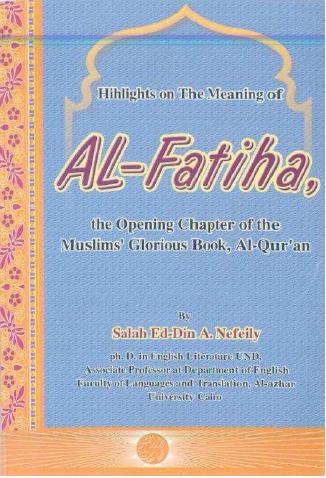Highlights On the meaning of Al-Fatiha

Verse Three:
الرَّحْمنِ
الرَّحِيمِ {الفاتحة/3}
"The All and Ever merciful , the Compassionate.”
When Allah describes Himself in verse two as the Lord of the Worlds, He,
soon, wants to make people feel at ease when he describes Himself in the third
verse as the 'All and Ever-Merciful] 'the Compassionate’ According t0 Ash-Shaarawi,
these attributes of Allah d0 not express different degrees 0f mercy. Each 0f
A1lah's attributes represents its ultimate quality. The two attributes are different
attributes rather than different degrees 0f the same attribute (48). These two
attributes are used here to help a person overcome his feelings of guilt in
case he has sinned against Allah. Allah is merciful even to the sinners and
disbelievers. He sustains them and keeps them alive. This verse implants hope
in sinners.
It is narrated that some of the creations of Allah like earth and the
skies will be dissatisfied with Man's sins. They will ask Allah to send them
for the destruction of sinners. Allah, mercifully, will calm them down and say that
Man is His own creation and He will take care of him. He corrects them;
"If you had created Man, you would have been merciful to him. lf Man
repents, he will be in My company and if he does not repent, I will be his Healer"
(Shaarawi 61 ).
Shihata explains that the attribute 'Ar-rahman` means that Allah is
merciful in himself and that mercy is part of His being. The attribute
"Ar-Rahim" refers to the application of this attribute of mercy to
His creation. The relationship between the two attributes of /Rahman/ and /Rahim/
according to Shihata is similar to the relationship between the two attiributes
"rich" and "generous". The word "rich" refers to
the existence of the quality of having much money. The attiribute
"generous" extends the attribute of being "rich" to others
(13). This conception of a loving and merciful God is different from The Greek and
Roman conception of revengeful and resentful gods. Muhammad Hisham Ed-Dieb says
that the two attributes Ar-rahman and Ar-rahim refer to Allah's mercy when he sent
his Prophet Muhammad to human beings (16).
Sayyid Qutb explains that we, as readers, should not very much concern
ourselves with the difference between the two attributes /Ar-rahman/ and
/Ar-rahim/. It is sufficient to know that the two attributes cover all kinds and
aspects of mercy in both this and the After-life (24). Allah's emphasis on the
attributes of mercy in this first chapter of the Qur'an reminds us of His
loving nature. In so many of his sayings, Allah indicates that His mercy precedes
His anger.
Ar-Razi explains that when a reader uses one of the attributes of Allah
in his prayers, he implicitly asks Allah to exercise this attribute on him.
When, for example, he says 'O. Allah, you are the All and Ever-Merciful] he implicitly
asks Allah to exercise His mercy on him and so is the case with all other names
and qualities of Allah (Vol.l: 128).
